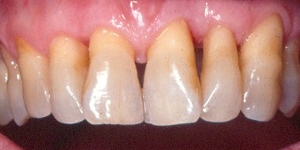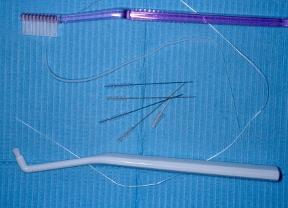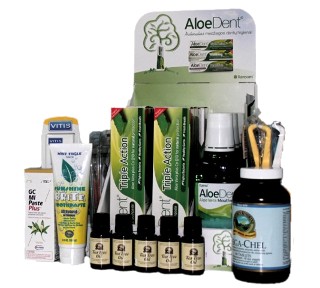Prevention of diseases

Lack of oral hygiene is the main cause for many oral diseases. It is a paradox but constant incorrect cleaning may cause great harm to teeth, especially gums. Regular preventive examination of oral health prevents from developing severe oral pathologic conditions requiring expensive treatment. Prevention always pays back.
The mouth is a mill of food: food debris inevitably build up on teeth, between teeth, under gums and on the tongue. This allows for reproduction of bacteria along with the processes of fermentation and decay. Consequently, they cause bad breath, dental and gum diseases.
 |
 |
|
Dyed food residues |
Consequences of intensive yet incorrect cleaning of teeth |
A professional oral hygiene is a preventive treatment during which the dental hygienist removes the build-up of food debris (plaque and calculi), polishes teeth that were restored long ago or inaccurately, examines oral health. And what is most important, a patient is explained and shown how to maintain oral hygiene properly and what products to use.
Cleaning of teeth is not merely brushing the areas easily reached by a toothbrush. There are plenty of pits and fissures where food debris builds up in the mouth. Therefore, a professional with good knowledge of oral anatomy has to explain how to brush even those pits and fissures which are most difficult to reach.
To obtain a long-term result, professional oral hygiene must be performed prior to any treatment of oral diseases, dental restoration and teeth whitening. It is usually recommended to undergo this treatment at least once or twice a year. The frequency of professional oral hygiene is determined more precisely by the dental hygienist taking into consideration the patient’s ability to maintain oral health.
How do calculi form?
 |
| Formation of calculus under the gums |
When teeth are cleaned improperly or insufficiently, in particular, when there are a lot of low-quality dentures or fillings in the mouth, food residues build up in the form of a paste and the so-called soft plaque forms. Approximately in a week’s time, this unremoved soft plaque starts to harden due to mineral substances in the saliva and the so-called calculi form. Food residues adhere to the already-formed calculi even faster, it is more difficult to brush teeth and even larger calculi form. Local immunity of gums is no longer able to cope with an increasing amount of bacteria and the inflammation of surrounding tissues starts.
Why to remove plaque?
 |
 |
|
| Pathological periodontal condition | ||
How professional oral hygiene is performed?

Calculi form even on and under gums, therefore it is impossible to clean them well without a professional assistance. Besides, special instruments are required for that (e.g. ultrasound, manual) and the knowledge of oral anatomy. Therefore, professional oral hygiene is performed by a dental hygienist or dentist. When a patient’s teeth and gums are sensitive, anaesthesia is applied. Depending on the amount of plaque build-up, one or two appointments are required for cleaning. Upon removal of calculi, teeth can be additionally cleaned by the method of air abrasion and, definitely, polished. By using the method of air abrasion, a special solution of medical sodium carbonate and water  removes dental stains caused by smoking, heavy consumption of coffee, black tea and other highly pigmented food. After the treatment, teeth become whiter and clean to a maximum extent. This treatment is recommended prior to teeth whitening.
removes dental stains caused by smoking, heavy consumption of coffee, black tea and other highly pigmented food. After the treatment, teeth become whiter and clean to a maximum extent. This treatment is recommended prior to teeth whitening.
What is most important, during a preventive appointment a dental hygienist has to give advice on how to clean teeth correctly (without causing any harm), choose the right toothbrush and when to use additional teeth cleaning products: tongue scrapers, dental flosses, mouthwashes, interdental brushes or special dental flosses intended for cleaning under bridge dentures. Daily oral care should become fast and effective.
Instruments for oral hygiene must be selected for each patient individually?
Neither a toothbrush nor special dental instruments cause harm to teeth provided they are used properly.
Why my grandfather’s teeth did not decay although he never cleaned them?

Let’s choose the best option:
1. My grandfather did not constantly eat snacks rich in carbohydrates.
2. His nutrition was based on non-refined, slow digesting and non-sticky food products.
3. He ate simple food rich in fibre which naturally cleans teeth: wholemeal flour, vegetables, fruit, various seeds, meat, a lot of dairy products. Sweet products were seldom eaten.
4. My grandfather was among the low percentage of the population whose strong teeth were determined by genes.
5. My grandfather did not complain about his teeth, most probably, they were healthy. My grandfather never went to dentists and nobody knows exactly the actual condition of his teeth.
Prevention of oral diseases
Naturalness must be sound in order not to become the victims of green, organic, spreading a lot of good ideas yet commerce. For instance, what toothpaste to opt for: fluorine or fluorine free? “Green” sellers would say that fluorine is a strong toxic substance. It is a very active element in the halogen group suppressing the enzyme system of the body, affecting bones, sometimes even teeth, etc. On the basis of this statement, fluorine-free toothpastes are offered to everyone with no exceptions without taking into account the condition of the mouth of a specific person. Such behaviour may be applied an old Lithuanian saying: “they heard the bells chiming but do not know in which church”. Fluorine is in fact a strong toxic substance but only when a large amount of it is eaten. Whereas, when used in the mouth for three minutes as long as teeth are cleaned, it will not cause any toxic response. Fluorine attaches to dental tissue and makes it much more resistant to decay. It was proven by a great deal of scientific research long ago. Whereas when cleaning teeth only with fluorine-free toothpastes, the activity of decay in the mouth is not reduced. Fluorine-free toothpastes clean teeth but do not provide them with increased resistance to withstand contemporary eating habits. We constantly snack at food rich in carbohydrates. In order not to leave space for groundless speculations, it is noteworthy that this data has been provided by of independent experts. Thus, fluorine should be treated as an effective medicine for decay for local rather than general use. As all medicines, it should help the body with a weak genetically determined link which the body cannot manage by itself. As a medicine, it should be used properly. It is important that fluorine levels in drinking water are not too high. People having no dental lesions or wearing dentures secured on implants do not need fluorine toothpastes. Children’s teeth should be cleaned with fluorine-free paste until children learn not to swallow it and spit it out. Taking into account the possibility of accidental swallowing, fluorine concentration in toothpastes depends on children’s age.
specialists Contacts Doctor's appointment



